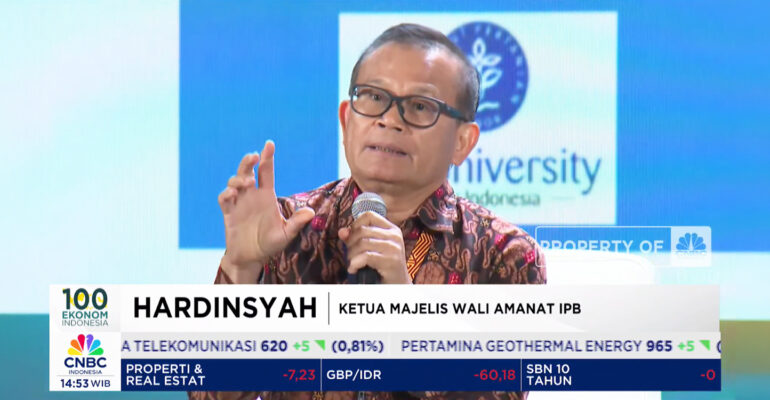Professor of IPB University: Stunting Problem Can Be Solved by Improving the Good Governance

Prof Hardinsyah, Professor of Nutrition Science, Faculty of Human Ecology (Fema) IPB University discussed the problem of stunting in Indonesia. He mentioned that the accumulation of nutritional intake from the fetal period to productive age can determine a person’s life expectancy (UHH).
He made this statement at the recent Sarasehan 100 Indonesian Economists organized by the Institute for Development of Economics and Finance (INDEF).
Prof Hardinsyah was one of the speakers at Cluster 4 Strengthening Human Resources for Quality Development, a panel with Vice Minister of Higher Education, Science and Technology (Wamendiktisaintek) Prof Stella Christie.
With the theme “New Leadership Estafet Towards Economic Acceleration”, the event was broadcast live on Consumer News and Business Channel (CNBC) Indonesia TV.
Starting the presentation, Prof Hardinsyah said that the UHH of Indonesian people is 72 to 74 years for women and 70 years for men. The average healthy period of Indonesian society is only up to 60 to 64 years. While the remaining 10 years is a period of illness.
“In contrast to Japan, the UHH of the Japanese people is 85 years with a sick period of only about 1 to 2 years. So the length of health is tremendous there,” he explained.
The professor who is the Chairperson of the Board of Trustees (MWA) of IPB University said that one of the factors causing this is the accumulation of nutritional intake from the fetal period until entering productive age.
“At the moment, 2 out of 10 children under five in Indonesia are stunted. This reflects that their internal organs are not good,” he said.
The interesting thing is that the stunting rate in Indonesia does not only come from poor families. Middle-class to well-off families also have children who are stunted due to unhealthy lifestyles.
Prof Hardinsyah has revealed that improved nutrition accompanied by improved health and environment will increase UHH and economic growth. In addition, an increase in healthy UHH accompanied by education will also increase the length of productive working age.
“From the view of nutritionists and economists, it is clear that nutrition, food, health, and education are all interconnected to produce the productivity of a country,” he explained.
In addition, Prof Hardinsyah also revealed that Indonesians still have high smoking intensity, unbalanced diet, and low physical activity.
“Data from the Central Statistics Agency (BPS) in 2024 states that household expenditure on tobacco or cigarette consumption rose from 5,3 percent to 6,3 percent. Then 93 percent of Indonesians do not eat enough vegetables and fruits and their activities are light. Furthermore, 4 out of 10 Indonesians have wide stomachs and a lot of fat deposits,” he said.
Personal to central governance is very important to bring a healthy lifestyle to life. “If the Free Nutritious Meal program is not accompanied by education, I am worried that sustainability for behavior change will be difficult,” said Prof Hardinsyah.
Prof Hardinsyah hopes that the governance budget in the new leadership era can be distributed on time, so that it will be right on target. He also hopes that information governance and data systems will be one-door in the future to minimize inappropriate handling.
“For example, the stunting cases in the middle and even upper class communities, means that the solution is not free nutritious food, but providing education,” he added.
Prof Hardinsyah said that out of 5 to 10 food groups, foods that can make you healthier, have good growth, including preventing stunting are fish, vegetables, and fruit.
Lastly, Prof Hardinsyah also mentioned that information on local market prices also needs to be done so that mothers can plan family food properly. (Nr/Rz) (IAAS/ZQA)



